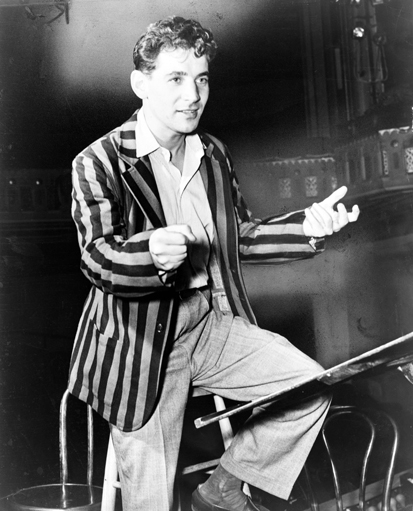Nigel Simeone’s title for his edition of Leonard Bernstein’s correspondence rings compellingly, novellistically, through the force of the definite article, as in The Aspern Papers, or The Scarlet Letter. The reality, though, is more diffuse. Bernstein was a man of enormous endowments. One correspondent, after listing his talents as a composer, orchestrator, pianist, conductor, lecturer and general all-round musical functionary, ends by enquiring ironically, ‘Can you cook?’
The list might have been extended. It could have included a wild diversity of sexual activity, a seemingly limitless gift for affection and friendship, an inexhaustible capacity for work, and a genius for self-promotion. What it could hardly have included was focus. ‘Is your mission in life,’ one old friend demands pettishly, ‘to be the greatest of all dilettantes?’ Bernstein himself discovers later on from ‘an old book of Chinese divination that my problem is one of self-limitation’. The Chinese, as usual, were right. If one thing emerges more than anything else from this lifetime of letters, it’s that even the most cornucopian talents can be spread too thin.
And if this sounds like a harsh judgment on a man who was unquestionably one of the most brilliant conductors of his generation, we have only to refer to his own opinion on the matter. ‘I’ve never felt so strongly,’ he writes to his sister as early as 1950, ‘how through I am with the conductor-performer life… and how ready I am for inner living, which means composing and [his wife] Felicia.’ Thereafter, he wrote one unquestionable masterpiece, West Side Story, ruined his marriage with gay affairs, and became for 30 years the epitome of the great maestro of the rostrum, the recording studio and the TV screen, before his death in 1990.
The conflict is well charted by Simeone’s choice of letters and superbly amplified by his exhaustively researched footnotes, which manage to identify and flesh out even the most obscure of his subject’s multifarious correspondents. From his early years, Bernstein made friends easily and (which is more impressive) kept them. Whether he is writing to old school chums or world-famous performers, composers or collaborators, his tone is natural, conversational, slangy and candid — even sometimes distressingly so. The chumminess can become wearisome, and the candour disturbing, as for instance when he admits to Felicia that his life on tour in Rome (in 1955) is ‘perverty, as is to be expected’.
There is even a feeling that the rougher side of the correspondence may have been to some extent edited out. Fights there are: with his tricky fellow composer David Diamond, with the choreographer Jerome Robbins. But they are not numerous. On the other hand, the word ‘love’ is much in evidence. The phrase ‘I love you’ is scattered like seed at the end of the most platonic missives. ‘You write the most wonderful letters,’ Aaron Copland, one of his closest friends, assures him, ‘the “I miss you, I adore you kind”, while sailors and marines flit through the background in a general atmosphere of moral decay.’
The implication of insincerity is not wholly undeserved. Bernstein had an ‘excessive need to be loved by everyone’, as Martha Gellhorn pointed out. Yet probably his worst epistolary (and perhaps personal) sin was gush, exaggerated emotion, verging at times on the sententious. Only with one correspondent, his great conducting mentor Serge Koussevitzky, does he wax insufferably, sycophantically false, and the sheer weight of the exception is a compliment to the rule.
The big disappointment of these letters is their general lack of musical substance. Bernstein was a more prolific composer than is sometimes recognised, and his range was wide, from the jazzy show style of On the Town and West Side Story to the elevated rhetoric of the Jeremiah and Kaddish symphonies. At times, the styles get confused. Late works such as ‘Mass’ and ‘Songfest’ combine real visionary touches with the worst effusions of pop religion, at which point it sometimes seems as if the mere demotic intention is sufficient excuse for any poverty of ideas.
Maybe this could be seen as the artistic aspect of radical chic, a term invented by Tom Wolfe precisely to describe the motivation of Felicia Bernstein’s notorious reception for the Black Panthers in 1970. But in any case there is not much discussion of the musical thinking behind this way of writing. Even the section on West Side Story is short on hard detail, apart from a feisty letter from Jerome Robbins, which raises fascinating issues about the balance between singing and dancing, and an appendix containing the librettist Arthur Laurents’s original, very detailed synopsis.
Such items fully justify Simeone’s decision to include letters and other material to, as well as from, Bernstein. But they evade the question of Bernstein’s own deeper thinking on the subject of the art that he practised with such passion and brilliance. We know more about that, of course, from his public talks, the Omnibus TV series of the 1950s, the Harvard lectures and the books that came out of them. From his letters we learn more about the adoration he gave and inspired, his emotional and sexual frailties, and his social and to some extent political self (he was a huge admirer of Israel, detested Nixon and Reagan and talked his way out of the McCarthy tribunals). It’s not a bad tally for any human being. But for a great artist, it may not be quite enough.






Comments